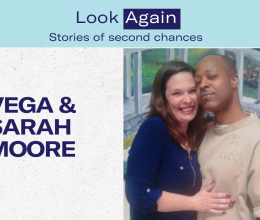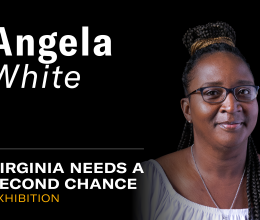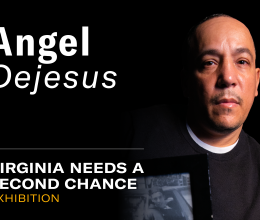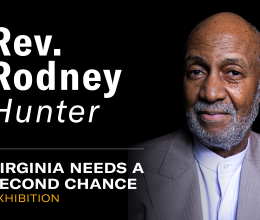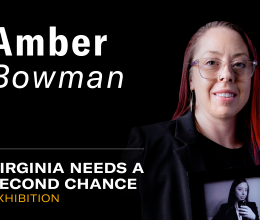This guest blog post was written by Fatimah Muwahhid, for her husband Talib Muwahhid.
As a Muslim, I believe that Allah makes things easy for you. I look at my life with my husband, Talib, and I feel such ease with our relationship. But “ease” is the last word many would expect me to use, because he is serving a 53-year sentence in the custody of Virginia Department of Corrections (VADOC).
Even with the trials we have been through, our love has always come with ease. “We have been together since the creation of our souls. You are my heart. Love, Your Fati.” This is inscribed inside my husband’s ring. He calls me Fati. We have always believed that we are soulmates.
Talib and I met through a mutual friend when I was helping him work on a pardon petition. We lost touch for a while, but when we got back in contact in 2018, Talib told me, “I will make you fall in love with me.” And so he did.
His confidence and intelligence drew me close to him. He is so easy to talk to and I can be myself with him. And the most important part of what Talib and I connected over is our faith.
But being incarcerated for 24 years had made him standoffish, and with so many years of dealing with authoritative personalities, he never saw the need to improve in that area. For example, he makes beautiful jewelry boxes, art work, and paintings, and he has even painted murals for counselors within the facilities where he’s held. Talib is so talented. But he was not always comfortable showing these talents to people.
Now, his confidence is much higher. He tells me all the time that our relationship has helped him want to be seen and heard. It makes him feel more human.
Connection with loved ones – including me – is what helped Talib heal and become a better person, so he wants to help others access the same thing. Both of us share a goal to improve life for those behind prison walls and their families through mutual healing. That’s why we got involved with The Humanization Project, an organization that seeks to humanize people who are incarcerated and advocate for more humane, rehabilitative laws and policies, and it’s why we founded Mutual Healing, a peer group program that Talib is working on starting within VADOC. Advocating with these organizations has inspired me to start a podcast with another advocate based on the experiences within criminal justice reform, Healing from the Inside Out, set to air this January.
We’re doing all this because – despite the ease of our love – loving someone in prison is hard. It comes with loneliness, lack of physical support, and a lot of expenses: speaking on the phone with Talib costs a minimum of $200 a month. But it’s the only way we can stay connected between visits, and between them, he feels the weight of the length of his sentence, and his inability to help support his family. I feel his absence, and how much I need a hug from my husband. Over the years we have learned to ride these waves, and I'll do it all for him.
To those who have a loved one inside prison, know that you are not alone. Stay connected through organizations and support groups. And remember to practice self-care. I love to garden, walk, and watch birds. My husband builds things with his hands. We both educate ourselves in our religion. The separation we have to endure is far from over. He has 27 years left to serve, we are both in our early forties and I am in congestive heart failure. But Talib and I have a lot of hope for the future. We know that Allah is the best of planners so if He chooses for us to unite early, it will be so. We also see that there is much hope for change from organizations like The Humanization Project and ACLU of Virginia, to legislators who support justice reform, and new bills that will continue the trend of change like Earned Sentence Credits – and to people like you who are reading my blog post and caring about our family.
For those with long sentences like Talib or even life sentences like many others we know, don’t give up hope. There’s a beautiful quote by Emily Dickinson: “Hope is the thing with feathers that perches in the soul and sings the tune without the words and never stops at all.” That’s what I focus on when I think of my family’s future.
Hope never stops at all: I won’t let mine disappear.


